英语语法导学案(1)
- 格式:doc
- 大小:63.00 KB
- 文档页数:2
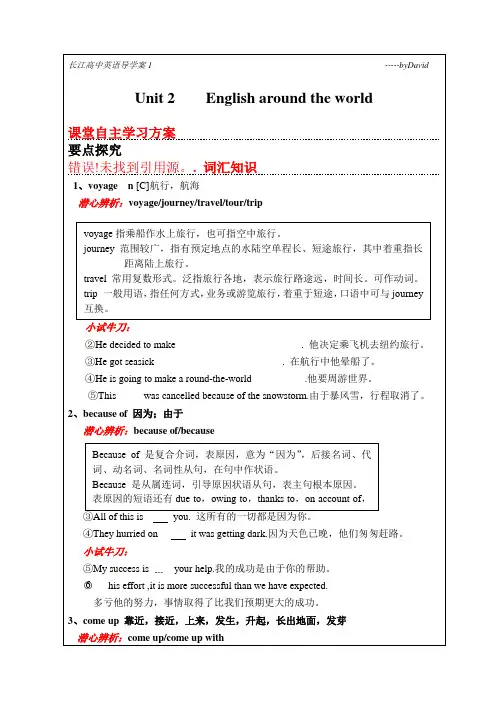
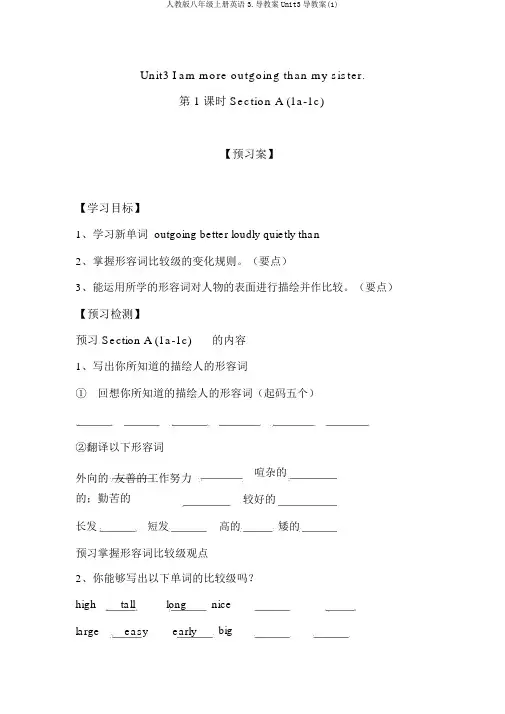
Unit3 I am more outgoing than my sister.第 1 课时 Section A (1a-1c)【预习案】【学习目标】1、学习新单词 outgoing better loudly quietly than2、掌握形容词比较级的变化规则。
(要点)3、能运用所学的形容词对人物的表面进行描绘并作比较。
(要点)【预习检测】预习 Section A (1a-1c)的内容1、写出你所知道的描绘人的形容词① 回想你所知道的描绘人的形容词(起码五个)②翻译以下形容词外向的友善的工作努力的;勤苦的喧杂的较好的长发短发高的矮的预习掌握形容词比较级观点2、你能够写出以下单词的比较级吗?high tall long nicelarge easy early bigthin beautiful interesting【研究案】【自主学习】1、童鞋们,你们会翻译下边的句子吗?I am taller than my sister.Mark runs faster than Tom.依据上边两个句子,你能总结出比较级的定义吗?①比较级用于之间的比较。
表示“表示此中一个比另一个”2、同学们经过做预习检测第二题你能自己总结出形容词比较级的变化规则吗?① 一般状况,在词尾直接加;如tall long② 以不发音的③以辅音字母加e 结尾的,加y 结尾的,变;如为nice,再加large;如:easy early④以重读闭音节结尾的,而且末端只有一个辅音字母的,双写最后一个辅音字母,再加 er;如 big ⑤在多音节和部分双音节词前加beautiful interesting thin组成比较级。
如:⑥不规则变化。
如good bad3、基本句型我能够总结出比较级基本句型主语++形容词比较级+than+比较对象【合作提高】童鞋们,让我们来一同翻译下边的句子吧!①山姆比汤姆矮。
②Ann 的头发比 Tina 的长③A pig is much heavier than an elephant.④Tom is a little shorter than his friend Jim.亲,你们有没有注意到句子中斜体单词的翻译,much,表示“ 得多”, a little 表示“一点儿”。
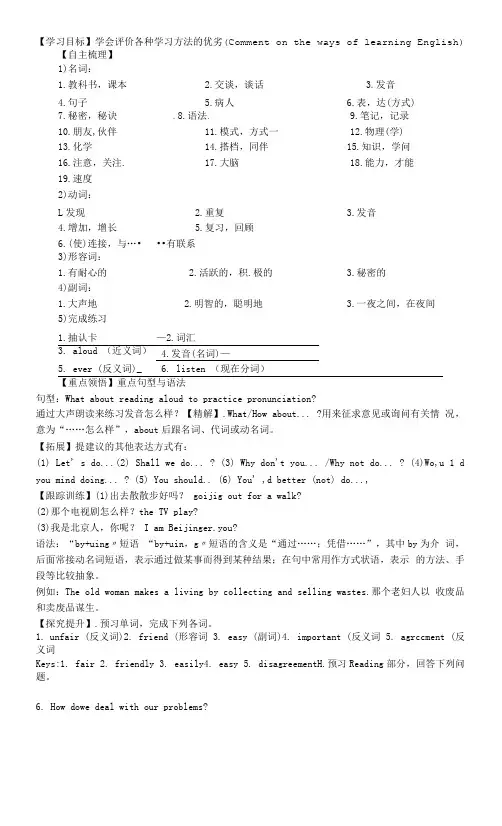
Unitl How can we become good learners ?,【学习目标】1.通过.交流和表达,进一步掌握学习英语的技巧与方法。
2.1.握下列知识点:单词.教科书,课本4.句子r ,7.秘密,秘诀重点短语:1.,通过制作单词卡片3.练习对话5.练习发音7.注意【自主梳理】预习单词,完成下列各词。
1.抽认卡 3. aloud (近义词)5. ever (反义词)7. study (过去分词)2.交谈,5.病人8.语法谈话3.发音6.表达(方式)9.笔记,记录2.4.6.2.向某人请求帮助4.爱上,喜欢上6.第一次8.犯错误词汇发音(名词)—listen (现在分词)(课本中查找答案)1.,2. 3. 4 5. 6. 7.【重点领悟】① How do you studyfor a test?语法:by+ V-ing的用法【探究提升】I.用所给单词的适当形式填空We studyby (work) with a1.It is a great way(1earn)②What about listening to tapes?3.W hat about (read) aloud n.根据汉语提示完成句子Have youever4.I study English group. a language.(practice) pronunciation and intonation?一(和朋友一起练习对话)friends?(通过制作)flashcards.6. (怎么样)listening to tapes?7.这个问题太难了,我理解不了。
It's hard m,e this question.8.朗读能提高你的口语。
-can your spoken English.Keys: 1. working 2. to learn 3.. Reading , preicticing 4. practiced witch friends5. by making 6. How about 7. too, for, to understand 8. Reading , improve.Unitl How can we become good learners ?【学习目标】学会评价各种学习方法的优劣(Comment on the ways of learning English) 【自主梳理】1)名词:1.教科书,课本2.交谈,谈话3.发音4.句子5.病人6.表,达(方式)7.秘密,秘诀.8.语法.9.笔记,记录10.朋友,伙伴11.模式,方式一12.物理(学)13.化学14.搭档,同伴15.知识,学问16.注意,关注. 17.大脑18.能力,才能19.速度2)动词:L发现 2.重复 3.发音4.增加,增长5.复习,回顾6.(使)连接,与…•••有联系3)形容词:1.有耐心的2.活跃的,积.极的3.秘密的4)副词:1.大声地2.明智的,聪明地3.一夜之间,在夜间5)完成练习1.抽认卡—2.词汇3. aloud (近义词)_4.发音(名词)—5. ever (反义词)_6. listen (现在分词)【重点领悟】重点句型与语法句型:What about reading aloud to practice pronunciation?通过大声朗读来练习发音怎么样?【精解】.What/How about... ?用来征求意见或询问有关情况,意为“……怎么样”,about后跟名词、代词或动名词。
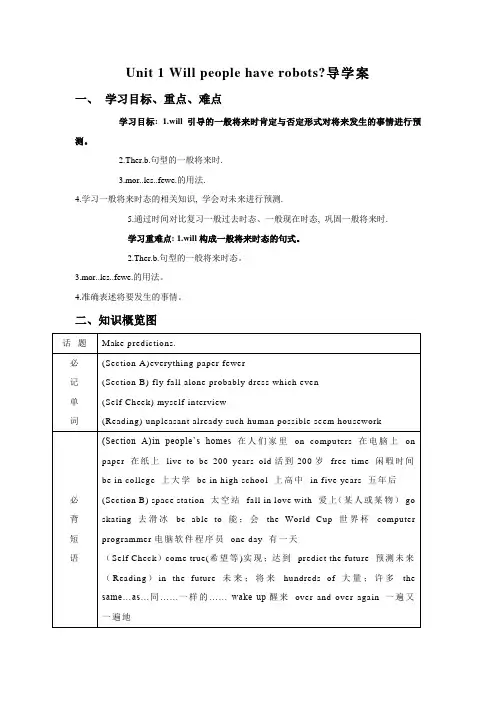
Unit 1 Will people have robots?导学案一、学习目标、重点、难点学习目标: 1.will引导的一般将来时肯定与否定形式对将来发生的事情进行预测。
2.Ther.b.句型的一般将来时.3.mor..les..fewe.的用法.4.学习一般将来时态的相关知识, 学会对未来进行预测.5.通过时间对比复习一般过去时态、一般现在时态, 巩固一般将来时.学习重难点: 1.will构成一般将来时态的句式。
2.Ther.b.句型的一般将来时态。
3.mor..les..fewe.的用法。
4.准确表述将要发生的事情。
二、知识概览图三、新课导引To ask the students some questions, such as, do you want to live on the moon? Can you guess what will happen in ten years? Then collect the students’ answers and say something about their predictions.四、教材精华1.D.yo.thin.ther.wil.b.robot.i.people’.homes.你认为在人们家里将会有机器人吗?(1)本句是一个含有宾语从句的复合句, 省略了that, there will be robots in people’s homes 作think的宾语, 为宾语从句。
Do you think the boy will buy a few new computer games?你认为这个男孩会买一些新电脑游戏吗?(2)从句there will be robots in people’s homes为there be 句型的一般将来时, 其结构为“There + will be +主语+其他”, 表示“将会有……”。
There won’t be any pollution some day.将来有一天会没有污染。

语法填空谓语动词与非谓语动词之解题策略Teaching objectives:1. You are supposed to judge when to use the predicate verbs and nonpredicate verbs.2. You are supposed to fill in the correct forms of the verbs given in the sentences.Teaching procedures:Step 1:Lead in learn from the mistakes you have made1.So far, the imported coffee business (embrace)the Chinese style and culture to create a new image for coffee as a lifestyle beverage.2.The ink stones (produce)in Anhui’s Shexian county are wellknown for their ability to keep the ink wet for a long time and their amazingly detailed patterns.Step 2: Strategies of dealing with the problemsTypical problemsStrategies of dealing with the problems解题步骤:a.识别谓语动词找出下列所给词汇中哪些是谓语动词形式哪些是非谓语动词形式。
1. operating2. to achieve3.obtains4.given5.will be punished6. to be solved7. have elected8.choose9. chose 10. chosen 11. being constructed 12. are considering 13.having learned14. can get 15. was thinking 16.considered谓语动词:非谓语动词:b.观察句子,找出句子中是否有谓语动词和连词,总结何时用谓语动词,何时用非谓语动词并将下面的思维导图补充完整。
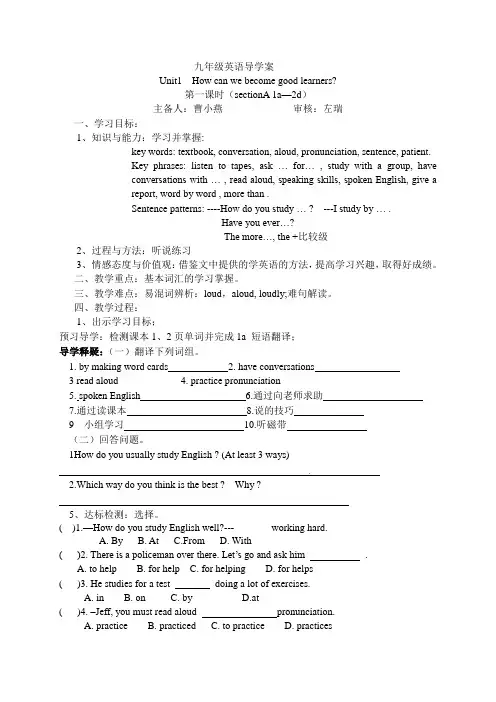
九年级英语导学案Unit1 How can we become good learners?第一课时(sectionA 1a—2d)主备人:曹小燕审核:左瑞一、学习目标:1、知识与能力:学习并掌握:key words: textbook, conversation, aloud, pronunciation, sentence, patient.Key phrases: listen to tap es, ask … for… , study with a group, haveconversations with … , read aloud, speaking skills, spoken English, give areport, word by word , more than .Sentence patterns: ----How do you study … ? ---I study by … .Have you ever…?The more…, the +比较级2、过程与方法:听说练习3、情感态度与价值观:借鉴文中提供的学英语的方法,提高学习兴趣,取得好成绩。
二、教学重点:基本词汇的学习掌握。
三、教学难点:易混词辨析:loud,aloud, loudly;难句解读。
四、教学过程:1、出示学习目标;预习导学:检测课本1、2页单词并完成1a 短语翻译;导学释疑:(一)翻译下列词组。
1. by making word cards2. have conversations3 read aloud ________ 4. practice pronunciation ________________5. spoken English6.通过向老师求助7.通过读课本8.说的技巧9 小组学习10.听磁带(二)回答问题。
1How do you usually study English ? (At least 3 ways)2.Which way do you think is the best ? Why ?5、达标检测:选择。
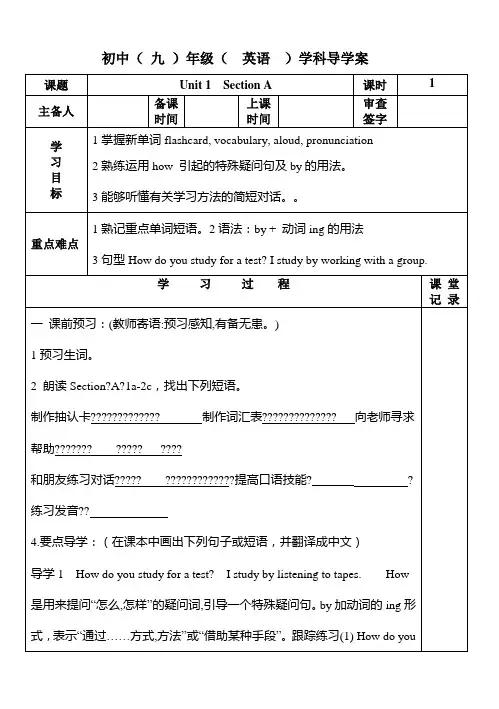
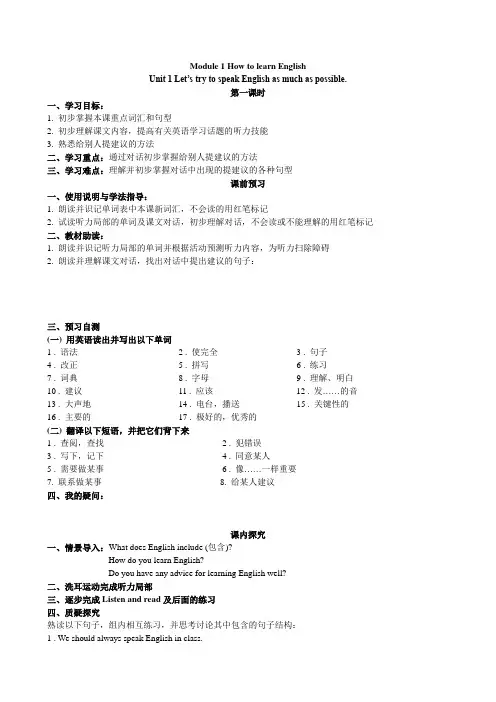
Module 1 How to learn EnglishUnit 1 Let’s try to speak English as much as possible.第一课时一、学习目标:1. 初步掌握本课重点词汇和句型2. 初步理解课文内容,提高有关英语学习话题的听力技能3. 熟悉给别人提建议的方法二、学习重点:通过对话初步掌握给别人提建议的方法三、学习难点:理解并初步掌握对话中出现的提建议的各种句型课前预习一、使用说明与学法指导:1. 朗读并识记单词表中本课新词汇,不会读的用红笔标记2. 试读听力局部的单词及课文对话,初步理解对话,不会读或不能理解的用红笔标记二、教材助读:1. 朗读并识记听力局部的单词并根据活动预测听力内容,为听力扫除障碍2. 朗读并理解课文对话,找出对话中提出建议的句子:_____________________________________________________________________________ _____________________________________________________________________________ _____________________________________________________________________________ _____________________________________________________________________________ 三、预习自测(一) 用英语读出并写出以下单词1 . 语法2 . 使完全3 . 句子4 . 改正5 . 拼写6 . 练习7 . 词典8 . 字母9 . 理解、明白10 . 建议11 . 应该12 . 发……的音13 . 大声地14 . 电台,播送15 . 关键性的16 . 主要的17 . 极好的,优秀的(二) 翻译以下短语,并把它们背下来1 . 查阅,查找2 . 犯错误3 . 写下,记下4 . 同意某人5 . 需要做某事6 . 像……一样重要7. 联系做某事8. 给某人建议四、我的疑问:_____________________________________________________________________________ _____________________________________________________________________________课内探究一、情景导入:What does English include (包含)?How do you learn English?Do you have any advice for learning English well?二、洗耳运动完成听力局部三、逐步完成Listen and read及后面的练习四、质疑探究熟读以下句子,组内相互练习,并思考讨论其中包含的句子结构:1 . We should always speak English in class.2 . Let’s try to speak English as much as possible.3 . Why not write down the mistakes in our notebooks?4 . Don’t forget to write down the correct answers next to the mistakes.5 . It’s a good idea to spell and pronounce new words aloud every day.6 . How about listening to the radio?7 . You just need to listen for key words and main ideas.]8 . Why don’t we try to find some English pen friends?五、当堂检测一、根据句意及汉语提示完成单词。
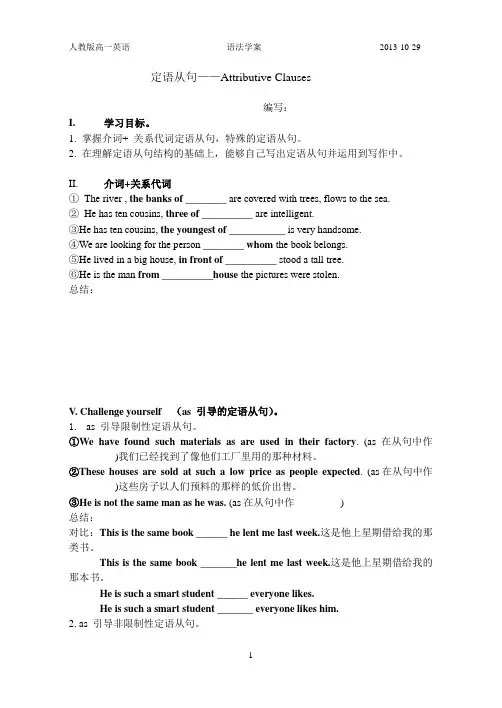
定语从句——Attributive Clauses编写:I.学习目标。
1. 掌握介词+ 关系代词定语从句,特殊的定语从句。
2. 在理解定语从句结构的基础上,能够自己写出定语从句并运用到写作中。
II.介词+关系代词①The river , the banks of ________ are covered with trees, flows to the sea.②He has ten cousins, three of __________ are intelligent.③He has ten cousins, the youngest of ___________ is very handsome.④We are looking for the person ________ whom the book belongs.⑤He lived in a big house, in front of __________ stood a tall tree.⑥He is the man from __________house the pictures were stolen.总结:V. Challenge yourself (as 引导的定语从句)。
1.as 引导限制性定语从句。
①We have found such materials as are used in their factory. (as 在从句中作_________)我们已经找到了像他们工厂里用的那种材料。
②These houses are sold at such a low price as people expected. (as在从句中作_________)这些房子以人们预料的那样的低价出售。
③He is not the same man as he was. (as在从句中作_________)总结:对比:This is the same book ______ he lent me last week.这是他上星期借给我的那类书。

七年级英语期中语法(时态)复习导学案一、一般现在时(1)一般现在时:包含行为动词的一般现在时的肯定形式、否定形式、疑问形式的句型结构。
肯定句:主语+行为动词+其它。
否定句:主语+don' doesn't+行为动词(动词原形)+其它。
一般疑问句:Do/Does + 主语+动词原形+其它?肯定/否定回答:____________特殊疑问句的结构:特殊疑问词+ 一般疑问句?(2)标志词:always (总是)often (经常)usually (通常)sometimes (有时)seldom (很少)never (从不)等频率副词的用法,一般放在be动词/助动词/情态动词后面,行为动词前面。
当主语是第三人称单数(he/she/it等)时,谓语动词要变为第三人称单数形式。
例句:a. Meimei often gets up at six in the morning. b. He never plays computer games.c. Wang Kai always has lunch at school.(3)反馈练习A. (一)用所给词的适当形式填空。
1. He watches TV every evening. (watch)2. We always go to school on foot. (go)3. Tom, with his classmates, often plays football after school. (play)4. Your shoes are under the bed. (be)5. His uncle usually goes to work by bus. (go)6. I always get up at six in the morning. (get)7. He never makes a cake himself. (make)8. John looks like his father. (look)B. 根据要求完成句子1)He has breakfastat 7 o ' clock就划线部分提问)What time does he have breakfast?2)My sister goes to the zoo to see the panda对划线部分提问) Why does your sister_go to the zoo?3)Daming goes shopp ing with his pare nts on Sun day变成否定句)Dami ng doesn'tgo shopp ing with his pare nts on Sun day.4)He does his homework in the evening 线提问) When does he do his homework?5)Lin gli ng gets a prese nt card on her birthday.(改为否定句)Lin gli ng doesn 'tget a prese nt card on her birthday.6)Betty likes Chinese food very much.(改为一般疑问句)Does Betty _like Chinese food very much?7)My sister plays the piano and likes to sing.改为否定句)My sister can 'tplay the pia no or like to si ng.8)Betty ' s aiamtd uncle live in the USA.(对画线部分提问)Where do Betty ' s aunt ajnnble live?9)My father often buys me some presents.改为同义句)My father ofte n buys some prese nts_for me.10)There are many trees in front of our classroom.改为同义句)There are lots of trees in front of our classroom.二、现在时进行时(1)现在进行时:表示正在进行和发生的动作。
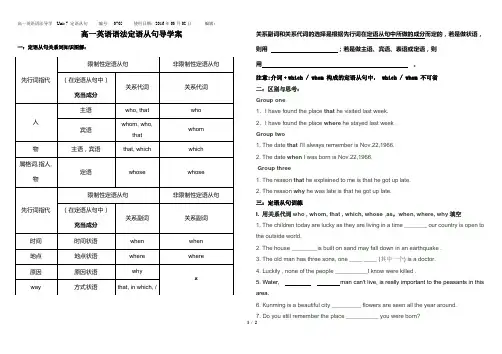
高一英语语法定语从句导学案一:定语从句关系词知识图解:关系副词和关系代词的选择是根据先行词在定语从句中所做的成分而定的,若是做状语,则用;若是做主语、宾语、表语或定语,则用。
注意:介词﹢which / whom 构成的定语从句中, which / whom 不可省二:区别与思考:Group one1.I have found the place that he visited last week.2.I have found the place where he stayed last week .Group two1. The date that I’ll always remember is Nov.22,1966.2. The date when I was born is Nov.22,1966.Group three1. The reason that he explained to me is that he got up late.2. The reason why he was late is that he got up late.三:定语从句训练I. 用关系代词who , whom, that , which, whose ,as,when, where, why填空1. The children today are lucky as they are living in a time _______ our country is open to the outside world.2. The house ________is built on sand may fall down in an earthquake .3. The old man has three sons, one ____ ____ (其中一个) is a doctor.4. Luckily , none of the people __________I know were killed .5. Water, man can't live, is really important to the peasants in this area.6. Kunming is a beautiful city _________ flowers are seen all the year around.7. Do you still remember the place __________ you were born?1/ 28. Do you know the reason ____________ he killed himself?9. He lives in the room ___________window faces south.(=the window )10.___________ is known to all, he is the best student in our class.11. China has a lot of islands, the largest _____ _____(最大的)is Taiwan island.12. I,________ is your good friend, will of course try my best to help you out.13. He reached London in 1996,________ , some time later, he became a famous actor.14. Mr Green will come to the party on Sunday, ________ he promised to every one of us.15. The professor has two sons, both of ________ are teaching in the same university.16. The film brought the hours back to me ________ I was taken good care of in that far away village.II.单句改错专题训练1. This is the museum where I once visited.2. The pencil with that he is writing is his.3. This is the house where I lived in last year.4. The doctor, who the nurse is talking to him, is leaving for Africa next month.5. All what is needed is a supply of oil.6. She heard a terrible noise, that made her swallow her heart.7. Is this the book which you're looking?8. I don't like the way which you speak to her.9. The child who parents died is called an orphan.10. He soon spent the money, most of it was earned in a dishonest way.11.In the distance there is a hill, on the top of it stands a white temple.12. The sun gives off light and warmth, that makes it possible for plants to grow. 1. where -- that / which 或where 2. that – which 3. in 4. him 5. what -- that 6. that –which 7. looking后加for 8. which -- that 或which 9. who -- whose 10. it – which III. 完成句子1. ________________ (众所周知), the moon travels around the earth once every month.2. Jack has won the first prize, ________________ (像往常一样).3. York, ________________ (我参观的) last year, is a nice old city.4. Lucy and I made an appointment of an interview on Sunday afternoon,_______________(到那时)I would be free.5. She gave another piece of advice, ________________ (我认为) is of great help to theresearch work.1. As is known to everybody / all2. as often happens / as usual3. which I visited4. by which time5. which I thinkIV. 把下列汉语翻译成英语。
《Lesson 1 》导学案一、学习目标1、理解并掌握本节课的重点词汇和短语,如_____、_____、_____等。
2、能够熟练运用本节课的重点句型,如_____、_____、_____等进行日常交流。
3、了解本节课所涉及的语法知识,如_____的用法,并能正确运用。
4、通过阅读和听力练习,提高对英语语言的理解和获取信息的能力。
二、学习重难点1、重点重点词汇和短语的记忆与运用。
重点句型的结构和用法。
2、难点复杂语法知识的理解和掌握。
听力和阅读材料中长难句的理解。
三、学习方法1、预习:在学习新内容之前,预习课本和相关资料,标注出不理解的地方。
2、听讲:认真听讲,积极参与课堂互动,及时记录重点和难点。
3、练习:通过做练习题巩固所学知识,发现问题及时解决。
4、复习:定期复习所学内容,加深记忆,提高运用能力。
四、学习过程1、词汇学习展示本节课的重点词汇,如_____、_____、_____等。
通过图片、例句、情景等方式帮助学生理解词汇的含义和用法。
让学生进行跟读、拼写和造句练习,加强记忆。
2、句型学习介绍本节课的重点句型,如_____、_____、_____等。
分析句型的结构和语法特点,举例说明其用法。
组织学生进行模仿、替换和对话练习,熟练掌握句型。
3、语法学习讲解本节课的语法知识,如_____的用法。
通过例句和练习,让学生理解语法规则,并能够正确运用。
4、听力练习播放与本节课内容相关的听力材料。
让学生在听的过程中完成相关的听力任务,如填空、选择等。
听完后,核对答案,讲解听力材料中的重点和难点。
5、阅读练习提供一篇与本节课主题相关的阅读材料。
让学生快速阅读,了解文章大意,并回答一些简单的问题。
然后进行精读,分析文章中的长难句和重点语法,深入理解文章内容。
6、口语练习根据本节课所学的词汇、句型和语法,组织学生进行小组或全班的口语交流活动。
可以设定一些情景,让学生在实际情境中运用英语进行表达。
7、写作练习布置与本节课内容相关的写作任务,如写一篇短文介绍_____。
《Section A Grammar Focus》导学案一、学习目标1、能够理解并掌握 Section A 中所涉及的重点语法知识。
2、能够正确运用这些语法规则进行句子的构建和表达。
3、通过练习,提高对语法的实际运用能力,减少语法错误。
二、学习重难点1、重点(1)一般现在时的构成和用法,包括主语为第三人称单数时动词的变化规则。
(2)频率副词的使用,如 always, usually, often, sometimes, never 等。
(3)There be 句型的结构和用法,包括肯定、否定和疑问形式。
2、难点(1)一般现在时中,实义动词与 be 动词的区分和正确使用。
(2)There be 句型中,be 动词的单复数形式与主语的一致性。
三、学习方法1、自主学习:仔细阅读教材中的语法讲解和例句,初步理解语法规则。
2、合作探究:与同学交流讨论,共同解决学习中遇到的问题。
3、练习巩固:通过做练习题,加深对语法知识的理解和掌握。
四、学习过程(一)自主预习1、认真阅读教材 Section A 的内容,找出其中的语法知识点,并做好标记。
2、尝试总结一般现在时的构成和用法,以及 There be 句型的结构特点。
(二)课堂学习1、一般现在时(1)构成主语+ be (am/is/are)+表语主语+实义动词(当主语为第三人称单数时,动词要用相应的第三人称单数形式)(2)用法表示经常发生的动作或存在的状态。
表示客观事实或真理。
(3)第三人称单数形式的变化规则一般在动词词尾加 s,如:play plays。
以 s, x, ch, sh, o 结尾的动词,加 es,如:watch watches。
以“辅音字母+y”结尾的动词,把 y 变 i 再加 es,如:study studies。
2、频率副词(1)常见的频率副词有:always(总是),usually(通常),often (经常),sometimes(有时),never(从不)。
八年级英语(上)导学案Unit 1 Where did you go on vacation?单元参考答案(一)1. umbrella 2. buildings 3. tastes 4. dislike 5. wonder(二)1. going 2. ducks 3. anything 4. talking 5. took(三)1. so……that 2. delicious 3. coming up 4. look at 5. special (四)1-5 BDBCA 6-10 BBBAB(五)1. Where; go 2. didn’t do 3. did; visit 4. What did; do5. had a great time(六)1. was 2. anywhere 3. Did 4. anything 5. stayed(七)1-5 ADBCA 6-10 DBCDA(八)1-5 BBCDC(九)略Unit 2 How often do you exercise?A卷(45分)一、选择填空。
(15分)1-5 ABADB 6-10 BABBD 11-15ACACB二、完型填空。
(10分)16-20 ADCAC 21-25 DBBAC三、阅读理解。
(20分)26-30 BBCAC 31-35 AABBCB卷(55分)一、根据句子意思和所给的首字母,用适当的单词填空:(5分)1. often2. healthy3. times4. eating5. many二、句型转换。
(10分)6. How often does she go shopping?7. Jim doesn’t do his homework at 8 every day.8. How many hours does she practice playing the piano every day?9. What do your parents usually do on weekends?10. What is her favorite program?三、完成句子。
UNIT-7 ArtLesson-1 Masterpieces导学案1.本课生词、词组2.本课语法——名词性从句(主语从句、宾语从句、表语从句)一、主语从句的用法在句中起主语作用的从句称为主语从句。
引导主语从句的连接词主要有三类:从属连词that, whether, if;连接代词what, who, whose, whatever, whichever, whoever等;连接副词when, where, why, how。
1. that引导的主语从句that为从属连词,引导主语从句时,常用it作形式主语,此时that不充当任何成分,无词义,只起引导作用,一般不省略,表示确定的陈述,位于从句句首。
That he will succeed is certain.=It is certain that he will succeed.常用it作形式主语的句型有:(1)It+be+形容词(possible/likely/obvious/necessary/important/natural/wonderful/surprising,etc)+that 从句It’s natural that a student feel stressed before an exam. (That a student feel stressed before an exam is natural.)(2)It+be+过去分词(said/reported/thought/expected/decided/announced/arranged,etc)+that从句It’s said that the concert will be put off. (The concert is said to be put off)(3)It+seem/happen/turn out/occur to/matter等不及物动词及其短语+that从句It seems that he has set out early. (He seems to have set out early.)It happened that I was on the spot. (碰巧的是我正好在现场。
2020学年人教版高中英语必修三Unit1 Festivals around the worldWords【学习目标】1、课前预习、记忆单词,能够会读、会写。
2、通过查字典、小组合作探究,掌握单词的用法。
3、通过巩固练习提高并加深对单词的理解与应用。
【重点难点】重点单词:starve, gain, gather, award, admire, permission, apologize, drown, obvious, remind, forgiveI.【自主学习】The classification of parts of speechn. beauty, harvest, celebration, hunter, origin, ancestor, grave, incense, feast, skull, bone, belief, trick, poet, arrival, independence, agriculture, award, produce, rooster, Easter, parade, clothing, Christian, cherry, blossom, custom, rosebud. fool, necessity, permission, prediction, fashion, parking, sadness, herd, magpie, weep, announcerv.harvest, starve, trick, gain, gather, award, admire, fool, apologize, drown, wipe, weave, weep, remind, forgiveadj. religious, seasonal, independent, agricultural, energetic, lunar, Christian, worldwide, fool, obvious,II. 【合作探究】1. harvest /gather/get in n. /vt /vi. 收成,收获,收割1)Farmers are extremely busy during the harvest.(在收获季节)2) We will have a good harvest(大丰收)this year.3) Winter wheat is planted in the autumn and harvested in early summer. (而初夏收割)4) Farmers are harvesting/are gathering/are getting in their crops.(正在收割庄稼).用法总结:a good harvestharvest crops2. starve vi/ vt挨饿,很饿, (使)饿死;饿得要死starvation n.starve for sth.=be starved of =long for=be dying for=be thirsty for;渴望获得某事物1)Thousands of people starved(挨饿) after the crops failed this year.2) The wolf was starved into hanging itself.那只狼被饿得上吊而死。
高二英语语法学习之 分词作状语导学案课标要求:掌握分词的用法,并学会在具体语境中运用。
理解语法形式的表意功能,并能有效地运用; 逐步接触和了解较为复杂的语言现象,对较复杂的语言现象具有一定的归纳、分析和解释的能力。
学法指导:1. 学会去发现学习,根据所呈现句子,总结分词用法以及规律;2. 学会去通过寻找逻辑主语来确定分词的选择以及探究如何确定分词的时间和主被动形式;3. 根据分类高考试题,总结高考分词考查规律及掌握解题策略。
预习案 一、现在分词作状语 1. (2010上海) _______ (approach) the city centre, we saw a stone statue of about 10 metres in height.(时间状语) 2. (2012福建) Pressed from his parents ,and _______(realize) that he has wasted too much time, the boy is determined to stop playing video games.(原因状语) 3. (2004广东) ______(complete) the programme, they have to stay there for another two weeks.(原因) 4. (2005湖北) ______ (separate)from other continents for millions of years, Australia has many plants and animals not found in any other country in the world.(原因状语) 5. (2011北京) Sit down, Emma. You will only make yourself more tired, _______(keep) on your feet.(条件状语) 6. (2007陕西) ______(say) that she didn’t do a good job, I don’t think I am abler than her.(让步状语) 7. (2011陕西) More highways have been built in China, ______(make) it much easier for people to travel from one place to another.(结果状语) 8. (2011辽宁) _______(gather) around the fire, the tourists danced with the local people.(方式状语) 9. (2010江西) The lady walked around the shops, _______(keep) an eye out for bargains.(伴随状语) 10. (2008浙江) ______(realize) that he was in great danger, Eric walked deeper into the forest.(方式) 11.(2014湖南)There is no greater pleasure than lying on my back in the middle of the grassland, ____(stare) at the night sky.(伴随状语) 二、过去分词作状语 1. (2011天津) _______(translate) into English, the sentence was found to have an entirely different word order.(时间状语) 2. (2011四川) _______ (offer) an important role in the movie, Andy has got a chance to become famous.(原因状语) 3. (2012北京) _______(use) with care, one tin will last for six weeks.(条件状语) 4. (2005全国) _______(follow) some officials, Napoleon inspected his army.(方式状语) 5.(2014湖南)Children ,when (accompany)by their parents, are allowed to enter the stadium.(时间状语) 6.(2014天津)Clearly and thoughtfully________(write), the book inspires confidence in students who wish to seek their own answers.(原因状语) (让步状语) (1)名词+1. (2012全国I) The party will be held in the garden, weather _______(permit).(表条件)2. (2011浙江) Bats are surprisingly long-lived creatures, some _______ (have) a life span of around 20years.(补充说明) 3.(表原因) sent up three unmanned spacecraft, the most recent ______ (launch) at the end of last March. 比较下面两个句子: (1) The country has already sent up three unmanned spacecraft, the most recent of which ______ at the end of last March. (2) The country has already sent up three unmanned spacecraft, the fourth ______ at the end of next March. A. has been launched B. having been launched C. was launched D. to be launched (2)with+名词短语+分词作状语1. (2004北京) _______two exams to worry about, I have to work really hard this weekend.(原因状语)2. (2012辽宁) The old couple often take a walk after supper in the park with their pet dog _______(follow )them.(伴随状语)3. (2010山东)The living room is clean and tidy, with a dining table already _______ (lay) for a meal tobe cooked.(方式状语)4. (2007安徽) John received an invitation to dinner, and with his homework ______(finish), he gladly accepted it (时间状语) 四、 固定结构作状语1. 副词+ speakingGenerally speaking, men are stronger than women.2. 分词+ 介词 Judging from his expression, he is in a lousy mood.Allowing for her inexperience, she has done a good job. Talking of English, she is the best speaker.Taking everything into consideration, they ought to win this game. 3. 分词+(that )从句 Considering/Allowing that she has no experience, she has done a good job.Considering how far from perfect most human brains are, there isn't much threat from a computer. Supposing there was a war, what would you do?Granting that he has made a mistake, he is not to blame, for he intended to help us.探究案探究一:谓语或非谓语的确定比较下面三个句子:(1) In the dark forest lie many lakes, some of them large enough to hold several English towns. (2) In the dark forest lie many lakes, and some of them are large enough to hold several English towns.(3) In the dark forest lie many lakes, some of which are large enough to hold several English towns. Exx :1. He walked down the hills,softly to himself. (sing) 1. Waiting for a bus, a brick fell on my head.2.After doing my homework, the dog was fed.3.Looking out of the window, there are a lot of people in the street.4.Arriving home, the door was found locked.5.Being a pop fan, Jay Chou(周杰伦) is her favorite.Dressed up as Father Christmas and accompanied by a “guard of honor” of six pretty girls, he set off down the main street of the city riding a baby elephant called Jumbo.(《新概念英语》第2册L65)Exx:1. After jumping out of a boat, .A. the shark bites the manB. the shark bit the manC. the man was bitten by a sharkD. the man is bitten by a shark2. (2006陕西) Faced with a bill for $10,000, ______.A. John has taken an extra jobB. the boss has given John an extra jobC. an extra job has been takenD. an extra job has been given to John3. (2005全国II) While watching television, ______.A. the doorbell rangB. the doorbell ringsC. we heard the doorbell ringD. we heard the doorbell rings4. (2004上海) Having been attacked by terrorists, ______.A. doctors came to their rescueB. the tall building collapsedC. an emergency measure was takenD. warnings were given to tourists5. ______ a teacher in a university, it is necessary for you to have at least a master’s degree.A. To becomeB. BecomeC. One becomesD. One becoming探究三:非谓语主被动关系的确定1. (2009浙江) There is a great deal of evidence indicating that music activities engage different parts ofthe brain.2. (2012湖南) Time, used correctly, is money in the bank.3. (Grown/ Having grown) in a small village, I developed a great interest in agriculture.(选择)Exx:1. Though (raise) in San Francisco, Dave had always preferred to record the plain facts of small-town life.2. ① The topic ________________(discuss) everywhere currently is about the Diaoyu Island issue (问题).②The topic ________________(discuss) at tomorrow’s meeting is about the Diaoyu Island issue.③The topic _______________ (discuss) at yesterday’s meeting was about the Diaoyu Island issue. 探究四:非谓语动词时间的确定Exx:it clear to us that he didn’t agree with us, left the meetingroom.3. (2012重庆) _______(ask) to work overtime that evening, I missed a wonderful film.4. (2014江西) ___ (spend)nearly all our money , we couldn’t afford to stay at a hotel .5. (2014江苏)The lecture ________(give), a lively question-and-answer session followed.探究五:你能区分以下句式吗?1. have sb do sth2. have sb doing sth3. have sth to do/ to be done4. have sb/sth done经典赏析1. Tom broke the school rules and the teacher had him stand outside the classroom.2. It is not a good idea to have the machine running all the time.3. 1) I have a paper to be typed. Please ask Xiao Wang to do it.2) Sorry, I’m so busy. I have many things to do.4. People living near the airports often have their windows broken by the noise of the planes passingoverhead.Exx:1. It was freezing, so they had the fire______ (burn) all night long.2. You’d better have someone else _______ (repair) the computer. I’m busy now.3. His computer won’t start, so he must have it________ (repair).4. I can’t go out wit h you, for I have a computer (repair). Tom need it tomorrow.5. You should understand the traffic rule by now. You have had it (explain) often enough.训练案语法填空:阅读材料,在空白处填入适当的内容(不多于3个单词)或括号内单词的正确形式。